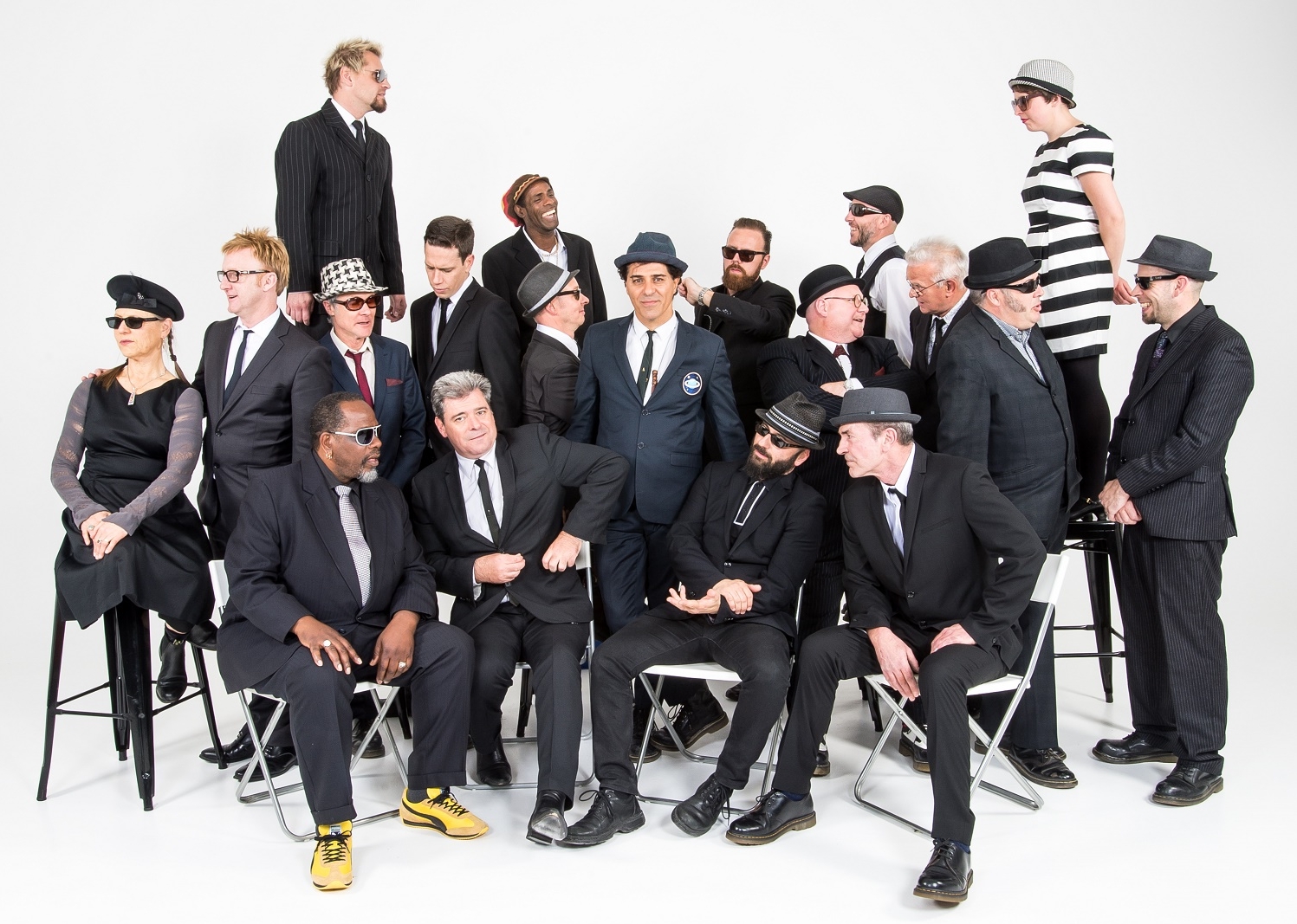Nicky Bomba is a man cut from a unique cloth. He has toured the world under various guises for decades, and his passion for performance (not to mention his unrestrained enthusiasm in conversation) has to be seen to be believed. The man is a powder keg, yet as captain of the Melbourne Ska Orchestra he shares the stage with anywhere from 14 to 35 other sharply dressed players, and he couldn’t be happier. Following their self-titled debut in 2013, the stars have at last aligned and MSO are back with Sierra Kilo Alpha.
“I think there’s a beautiful core, this great scene,” Bomba says. “I always break things into two worlds. There’s the creative, and then the organisation. The thing that can mess you up as a musician is doing all of that admin, booking the flights. It really eats into your creativity, so the ultimate aim is to find a way to be in that creative state the whole time as a band, and have someone else taking care of the other things.
“This new album is a great example of how we wanted to experiment with the ska form and really dig deep. We’re able to do that because the band has reached that point where it’s a well-oiled system. It’s just a matter of having planted a lot of seeds, and now we need to nurture them as we sow more. It doesn’t happen without any planning. The shows have to be good, your new songs have to be something different to what you’ve done before. It will always evolve. Any musician who is in it for longer than ten or 15 years, bands will develop, members will come and go, styles morph into something else, but that’s part of the joy as well. It’s not a static thing, and I find that incredibly exciting.”
The band’s latest single, the splendidly titled Funkchunk, finds them in epic, theatrical form. However, Satellite, the first single from Sierra Kilo Alpha, resonates most strongly with the soul of the MSO. With an outfit so large, it’s no simple task to ensure that each member can feel they are contributing equally. But as Satellite – and indeed, the album overall – demonstrates, this is a beast with many faces.
“You’ve hit the nail on the head,” Bomba says. “Ska is about community, it’s about hope, danger, and fun. It’s all those things. With ska, you have to take a bit of a risk. It was born of the independence of Jamaica in 1952, and that was an incredible time. Finally, they were going to be self-sufficient, it was an exciting time, and ska was synonymous with that. The Skatalites were the main band then. They played interesting solos, interesting chord formations. There was a lot of fantastic complexity.
“I was already playing reggae and dancehall and rocksteady anyway, so embracing ska was embracing the roots of everything I knew. So from a songwriting perspective in the band, this album opened things up even more. Everything was on the table – every idea, let’s try and make everything work. Sometimes they might just a couple of lines recorded on a phone that was then played over a Skype session. Everything went, and if you had some little idea, that was cool. We didn’t have to be in a special room under special conditions. I think as the captain, if you like, seeing that sense of family and feeling that love is really what the band is all about. It’s what music is all about. Go back to the earliest roots of music and it’s about celebrating a marriage or a birth, or someone is returning from a hunt. Music is celebration and community.”
If you’ve been fortunate enough to catch one of Melbourne Ska Orchestra’s live shows over the last few years, this would come as no surprise. Rarely will you find such packed crowds on their feet, dancing with benevolent energy. The MSO have found accolades both at home and abroad (Pauline Black, singer of ska revival band The Selecter, praised them in a Beat magazine interview last year), and their momentum seems certain to keep the dream run alive. After the uncertainty of launching such a cumbersome act – dozens of musicians, numerous instruments – it must be a relief for Bomba that the band has found some stability.
“I don’t think relief is the word. I think more amazement,” he laughs. “It’s not like we were trying to achieve any commercial success. Any songwriter would love to have a hit record that is played for everybody and ensures an audience. A lot of bands have one hit song and try and build a career on just that. If one of our songs became a hit our profile would grow a lot more, sure, we’d be able to do more performances at a better fee, so we just wouldn’t need to worry too much about all those financial concerns. That’d be a beautiful thing. But underneath it all is a love of music. The band couldn’t be what it is without that.”
“The first album was really a collection of that whole time together,” he elaborates, “having a lot of time to work on the songs and tour them around. It was a reflection of what our world was then, and sneaking in covers that had our own twist. This new album is, OK, we’ve made a footprint here, now, we can just do more of the same, or we can take it a step further. A lot of famous bands make their own sound by not copying style, not just looking at the charts to see what One Direction are doing. We’d never do that. But you do want to be able to be heard on the same playing field. So we spent more time mixing and mastering, we spent more time making sure that the ideas translated a lot stronger. It wasn’t just a ska-lovers album. It would be an album that has a wider appeal. Funkchunk is a perfect example of that. Going through that whole process, well, we love all these songs, but it’s hard to see the forest for the trees. So we put Funkchunk out there for feedback, and it was incredible! That, if you like, is an exercise in playing the commercial game. Of course we want to be successful, we want to be on more than the community stations, though their support has been amazing. But any artist is like that. You want your work to be appreciated and reach as many people as possible.”
It has been a long but thrilling road for Bomba and company. Sierra Kilo Alpha is the work of a band firing at their creative peak, but that isn’t to imply they have nowhere to go but down. There is always another mountain to climb, another ocean of sound this gregarious captain and his larger-than-life crew might sail.
“2003 was when the band started, but it was only as a celebration of ska. That year was the 40th anniversary of when Millie Small came out with My Boy Lollipop, which put ska on the map. The six or seven years after that, nothing really happened with the band. It was really just a tribute band that would come together once a year, but in 2009 I managed to find a festival spot in Queenscliff, and we changed tactics there. We started putting a better show together, and on that show, we actually got offered a recording contract to do ska covers, and I said, ‘No. We’re writing original songs, and that’ll be the album.’ In the end, we released it on the 50th anniversary of ska in 2013.
“I really don’t consider the years between 2003 and 2009 as MSO years. I was in the John Butler Trio, but at some point I acquired the name from my partner at the time, took over the band and really started to pull it together. I pinch myself, but also give a gentle pat on the back for everyone in the band. We all knew there was something interesting there, there was potential, and we all committed to seeing where it would go. The more we play, the more we get together, we realise with the musical talent in this band we could go anywhere. I’m excited about the next five years. Who knows the things we might do?”
BY ADAM NORRIS







